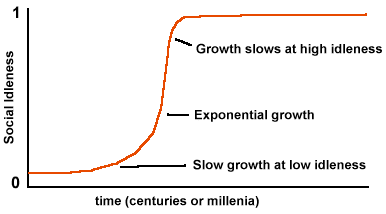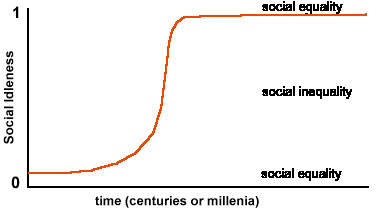
Economic Growth
The Long Term growth curve
In Idle Theory, economic growth means increasing idleness, and decline means falling idleness. Increased idleness is acquired through innovating new useful tools - tools whose value in terms of the time they save in some essential activity is greater than the time cost of making them. Theft, extortion, and slavery do not increase human leisure, but only redistribute it.
In the least idle societies, it may be impossible to innovate, because there is too little idle time available for the trial and testing and perfecting of new tools. Thus in the least idle societies, economic growth may be absent or very slow.
But once new tools appear, economic growth is likely to be exponential. For as new tools create more idle time, so more time can be spent in trying and testing new tools. And as the pool of available tools and techniques multiply, they can be combined together to create new generations of tools. in a gathering avalanche of new technology.
But such economic growth does not continue indefinitely. A top limit is reached when a society achieves - or approaches - perfect, complete, unit idleness. And at this stage the pace of economic growth must slow, not because of any lack of time in which to innovate, but because in a highly idle society it must become increasingly difficult to make further time savings. At this point, innovation slows and even stops.

The circumstances that result in this kind of runaway growth must be special. The least idle societies may not, as has been pointed out, be able to innovate. But equally the most idle societies, while able to innovate, have no need of it. For much of human history, the only means to achieve wealth and leisure was through the conquest and enslavement of other peoples. And even though the Greeks invented simple steam engines, they used them as toys rather than as labour-saving devices - because their work was anyway done for them by slaves. Technological innovation was largely reserved, then as now, for military purposes.
The most likely innovators were neither slaves nor the aristocrats they supported, but working free men looking for ways to make life easier for themselves. For if a slave worked out a better way of performing some task, his reward would mostly be to be given new tasks to do. And if an idle aristocrat did the same, it would not increase his already complete idleness.
Social Inequality during economic growth
Social equality is only guaranteed at zero or unit idleness. For at zero or near-zero idleness, everyone is obliged to work. And at unit or perfect idleness, nobody is obliged to work. Maintaining social equality during economic growth, however, is all but impossible.
For the innovator of a new and useful tool is able to sell it at the highest price, and reap a large profit, and become rich relative to his fellow men. It is only when competitors emulate his success, and produce the same or better at lower cost that prices tumble.
And arguably such innovators ought to be rewarded. The new tools and techniques they provide serve to raise social idleness, and to continue to benefit humanity for decades or centuries. If strict equality was enforced, apart from pure philanthropy, there would be little or no incentive to innovate and market new tools. Some degree of inequality must be tolerated, to reward innovators and entrepreneurs.
Thus economic growth must regularly create a class of rich and leisured individuals who have more money than they need to ensure themselves a life of leisure, and who can only spend the excess on luxuries and amusements and diversions. And their excess spending power creates new industries devoted to producing such luxuries. But for those who produce these luxuries, this work is as necessary and obligatory as any other. And since luxuries do not increase social idleness, but may often decrease it, the gains in social idleness produced by new tools may be entirely lost in the obligatory production of unnecessary luxuries.
Yet as economic growth continues, and underlying social idleness approaches perfect idleness, the numbers in society of the idle rich must increase relative to the working poor. The pool of individuals needing to find work making luxuries is likely to dwindle in size, and this labour force will be able to bid up the price of labour. And, unless the idle rich set themselves to work to make them, luxuries will gradually vanish from society.
At near-perfect idleness, human society would consist of almost completely idle individuals, possessing only those luxuries which they were prepared to voluntarily set themselves to work to produce, rather than which they could purchase using excess profits.

The Threat of Economic Decline
Economic growth can be reversed, and turn into economic decline.
Unchecked population growth leads to a Malthusian crisis. Even if new and improved food production results in ever higher crop yields, unrestricted population growth must eventually result in famine and starvation. But it seems that when societies reach some level of affluence, and infant mortality declines, it no longer makes economic sense to have as many children as possible to assist toiling parents in their fields or workshops, and population growth slows to zero or less.
But perhaps a greater danger lies in the social inequalities that enforce the obligatory production of inessential luxuries. For if the gains in idleness acquired by new tools and techniques are entirely reaped by their producers, and these excess profits are used to buy luxuries and amusements, then the real idleness of society does not increase, but instead increasing numbers of people are obliged to switch from producing necessities to producing luxuries. Thus although underlying or notional social idleness (social idleness if no luxuries were produced) is increasing, real experienced idleness may not increase at all. It may even decline. And more and more innovative thinking would be tend to be given to creating and marketing new luxuries rather than to designing useful new tools. And since increased productivity is not experienced as increased leisure, it instead emerges as increased material production. The economic machine then generates more and more goods, rather than more and more leisure. And the more it does this, the faster it eats into natural resources, pollutes rivers and atmosphere, perhaps even alters the global climate. At the same time, it erodes the hope that science and technology would improve the human condition, breeding renewed cynicism and despair. All this must largely be the result of monopolies and trusts maintaining artificially high prices, and suppressing competitors who might drive prices downwards to spread wealth more equitably.
And yet if economic growth should in fact result in near complete idleness, and innovation should cease, then a slow process of decline would set in - for it is almost an axiom of Idle Theory that idleness is always falling, that life is getting harder, and that it requires continual innovation simply to maintain the same degree of idleness.
